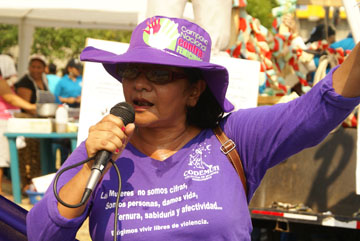WELCOME TO THE ARCHIVE (1994-2014) OF THE MAQUILA SOLIDARITY NETWORK. For current information on our ongoing work on the living wage, women's labour rights, freedom of association, corporate accountability and Bangladesh fire and safety, please visit our new website, launched in October, 2015: www.maquilasolidarity.org
June 19, 2013
Two complaints about the impact of high production targets and long work shifts on women workers’ health has exposed the limitations of existing multi-stakeholder code monitoring initiatives.
More than two and a half years after filing formal complaints with the Fair Labor Association (FLA) alleging that workers at Honduran factories owned by Hanesbrands Inc. and Gildan Activewear have suffered debilitating injures caused by long work shifts, the intense pace of production and high production targets, the Honduran Women’s Collective (CODEMUH) is withdrawing their complaints in frustration because of the lack of concrete appropriate action by the FLA.
CODEMUH announced their decision to withdraw their complaint against Hanesbrands in an April 3 letter to the FLA, stating, “In this particular case, the FLA has demonstrated delay tactics, negligence, and an evident lack of competence or pressure to ensure that the brand complies with its Code of Conduct, thereby justifying the violations against the workers.”

Maria Luisa Regalado, CODEMUH
CODEMUH filed two separate complaints about health and safety violations and discrimination against injured workers, one against Hanesbrands and the second against its Canadian competitor Gildan Activewear. CODEMUH has also informed MSN that it is withdrawing the complaint against Gildan, expressing the same frustration with that process. CODEMUH has provided the FLA with detailed responses and critiques of draft reports on both the Hanesbrands and Gildan investigations.
The primary problem, according to CODEMUH, is that the FLA investigations have ignored the central issues raised in the two complaints – that long work days and high production targets are resulting in debilitating muscular-skeletal injuries suffered by Hanesbrands and Gildan employees.
Instead, the FLA investigated the ergonomics programs at both Gildan and Hanesbrands factories to determine whether they were sufficient to reach their stated goals.
In its April 3 letter, CODEMUH also expressed anger over the reported dismissal of 11 Hanesbrands workers that they charge are suffering work-related health problems.
The FLA’s third-party complaint system allows workers and other interested parties to request investigations into specific labour rights violations at factories producing for FLA-member companies.
Such investigations are supposed to be concluded in a timely manner, and the results and corrective action plans reported publicly on the FLA website. The CODEMUH complaints, however, have been outstanding for more than two and a half years, and no reports have yet been issued.
“One possible reason for this inexcusable lack of action by the FLA is that the CODEMUH complaints have challenged something more fundamental than a discreet incident of abusive behaviour by managers or the lack of fire extinguishers in a factory, but point to systemic problems at the heart of the production process,” says MSN Executive Director Lynda Yanz, who resigned from the FLA Board of Directors in February.
“Most multi-stakeholder initiatives, including the FLA, have steered clear of issues related to the negative impacts of production processes on workers’ health and wellbeing, and have paid little attention to the cumulative health impacts of higher and higher production targets,” says Yanz.
This problem has been consistently raised by workers and their organizations in Honduras and other Central American countries, most recently in various studies by CODEMUH and ergonomics experts from Mexico’s Universidad Autónoma Metropolitana Plantel Xochimilco. At a May MSN-sponsored workshop in El Salvador, women labour rights activists from Central America and Mexico identified long work shifts and high production targets and their impact on women’s health and wages as priority issues for women maquila workers.
“If the FLA is incapable of dealing with the root causes of these serious work-related injuries, the two companies that were the subject of these complaints must answer for themselves as to what changes they are prepared to make in order to prevent such injuries from happening in the future,” says Yanz.
The Fair Labor Association has not yet responded to CODEMUH’s April 3 letter or to its previous comments on the Gildan and Hanesbrands draft reports.